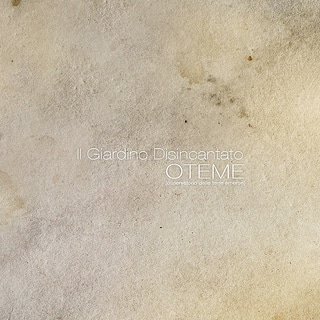“Le terre emerse sono isole, continenti da esplorare, dove una volta che ci siamo addentrati potemmo trovare luoghi familiari, ma anche strani, inusuali. Le nostre terre emerse sono zone in cui accadono cose non propriamente diritte, almeno secondo il mercato, ambiti di ricerca creativa, contaminazioni. L’osservatorio è una specie di laboratorio: molti dei musicisti che vi roteano attorno sono giovani e formati all’arte contemporanea in un percorso abbastanza lungo, faticoso, ma anche divertente”. Così Stefano Giannotti presenta OTEME – Osservatorio sulle Terre Emerse: un laboratorio aperto alle connessioni tra varie aree musicali e culturali, caratterizzato dall’eclettismo di fondo e soprattutto dall’elasticità, dal movimento indipendente e svincolato dalle logiche del mercato. Il disco d’esordio Il Giardino Disincantato ne è una prima e piena testimonianza.
OTEME è un ensemble da camera la cui ampiezza e consistenza variano a seconda dei brani e dei linguaggi adottati: Il Giardino Disincantato è un’operazione coraggiosa e poliedrica nella quale entrano in gioco diverse anime. Dall’eredità art-rock e progressive alle conquiste della musica colta classica e contemporanea, dalla canzone d’autore al teatro musicale fino alle asprezze del Rock In Opposition: strumenti inconsueti (componium, teponatzli, la glass harmonica suonata dall’autorevole Thomas Bloch, già ospite di Radiohead, Tom Waits, Gorillaz, John Cage etc.), ironia e surrealismo da Battisti-Panella a Stravinskji, dai King Crimson a John Cage. Come dichiara Giannotti: “L’idea che sta sotto al Giardino è quella della creazione di canzoni e brani non di fruizione immediata, usa-e-getta; in quasi tutti i brani sembra di stare fermi ma ci si muove, o viceversa, proprio perché non esiste una tonica ed una dominante, ma ci si muove su procedimenti modali sporcati da dissonanze e curiosità sonore“.
Il lucchese Stefano Giannotti (1963) è un compositore assai apprezzato all’estero – in particolare in Germania – per la sua lunga esperienza nel campo della radio arte: OTEME è un’esperienza complementare ai suoi lavori, con un’attenzione spiccata per l’unione tra colto e popular, per un’idea di rinnovato ascolto. “La musica, a volte anche quella colta, asseconda l’idea di un ascolto immediato: gran parte delle produzioni hanno un forte impatto sonoro ma poca sostanza, poiché grazie alla tecnologia e alla vita frenetica, insicura, ci siamo abituati alla superficialità, ad ascoltare musica mentre si fanno altre cose. Molta arte contemporanea basa il suo pensiero sulla molteplicità degli impulsi; in parte aderisco anch’io a questa visione, ma credo che sarebbe bello poter cominciare ad ascoltare di nuovo
“.———————————————
“Dry land is made of islands, continents to explore, where as we explore them we might be able to find familiar places, but also strange, unusual ones. Our land is areas where things happen not exactly straight: there are backgrounds of creative research and contamination. Observatory is a kind of laboratory, many of the musicians who took part in it are young and trained to contemporary art in a long enough, tiring, but fun path.” Thus Stefano Giannotti introduces us to his project OTEME – Observatory on land: a workshop, open to the connections between the various musical and cultural areas, characterized by eclecticism and especially by elasticity, movement, an independent area, free from the logic of the markets. The debut album “The Disenchanted Garden” is a first, and full testimony.
OTEME is a chamber ensemble whose amplitude and texture vary depending on the songs and the language adopted: The Disenchanted Garden is a courageous and poliedrical experience which display different souls. From progressive art-rock to the achievements of classical and contemporary classical music, from songwriting to musical to the rigors of Rock In Opposition: unusual instruments (componium, teponatzli, the glass harmonica played by the authoritative Thomas Bloch, already guest for Radiohead, Tom Waits, Gorillaz, John Cage etc.), humor and surrealism from Battisti – Panella to Stravinsky, from King Crimson to John Cage. Giannotti says: “The idea behind the Garden is the creation of songs not meant to be disposable; in almost all of the tracks the listener seems to stand still but moves, or vice versa, just because there isn’t a tonic and dominant, but it moves about in ways soiled by curiosity dissonance and sound.”
Stefano Giannotti (1963) is a composer from Lucca, Italy, much admired abroad – particularly in Germany – for its long experience in the field of radio art: the OTEME experience is complementary to his work, with a particular attention to the ‘union between cultural and popular, for an idea of renewed listening. “Music, sometimes even the educated kind, favors the idea of an immediate play: most of the productions have a strong impact noise but little substance, because thanks to technology and busy life, we have become accustomed to superficiality, listening to music while you do other things. Much contemporary art based his thinking on the multiplicity of impulses: partly I adhere to this view, but I think it would be nice to start listening again.”
www.stefanogiannotti.com/oteme.html
Synpress44 Ufficio Stampa:
www.synpress44.com




